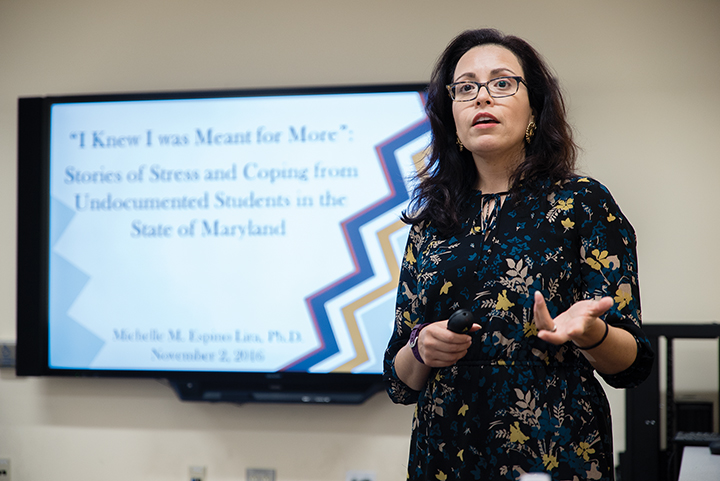By Benjamin Weiner
For The Diamondback
Undocumented students face high stress and depression levels when it comes to paying for college. But they also often demonstrate the desire to overcome adversity and persevere in an academic setting.
Education professor Michelle Espino presented findings from a survey of 50 undocumented students and 18 administrators across the state of Maryland, which asked about these issues and what coping strategies the students and administrators are using to deal with them.
Espino spoke as part of a University of Maryland Counseling Center discussion Wednesday that aimed to raise awareness about the challenges undocumented students face when applying for college.
The college application process can be one of the biggest stresses for undocumented students, Espino said, because not having a Social Security number makes it difficult to apply online. Many undocumented students also find it difficult to trust people outside their family, especially in disclosing their lack of legal citizen status, she said.
“We are all agents of the state being at this university, but we are not the police, and the students here need to understand that so they can trust us and we can build a stronger relationship with this group of students,” Espino said.
Financial barriers are another issue that undocumented students face.
“Children were granted rights to education K through 12 in the 1980s, but college is considered higher education and is viewed as more of a privilege than a right,” Espino said.
Paying for higher education is difficult for these students because, “Not only are these students not qualified for FAFSA because they are not U.S. citizens, but they are likely paying out-of-state tuition out of their own pockets,” Espino said.
This state offers programs that allow for undocumented students to attend college through the Maryland DREAM Act, as well as Deferred Action for Childhood Arrivals, which was passed by President Barack Obama. These programs allow certain undocumented immigrants who entered the country prior to their 16th birthday to work, attend school and get exempted from deportation.
But with less than a week until election day, some fear this election could impact these policies.
“This upcoming election is crucial because we could see documents like DACA and the DREAM Act repealed,” said Alice Mitchell, the Counseling Center’s testing office manager. “We’d be losing a lot of talent, not just here at Maryland but across the U.S. The effects, the emotional stress, the economic effects would be huge. It would be a horrible game changer.”
Counseling Center Director Sharon Kirkland-Gordon said the community has a social responsibility to familiarize themselves with the challenges undocumented students face.
“For many of us, I don’t think we’re aware of all of the various facets of what it means to be undocumented,” Kirkland-Gordon said. “Some people are misguided and just don’t have information, so I hope this event provides factual information and guidance for everyone.”
Espino challenged the community to consider how department policies and practices can create unnecessary stressors.
“I hope people gain an understanding of the experiences of undocumented students,” she said, “but then also about how our policies on campus can help or hurt these students.”



